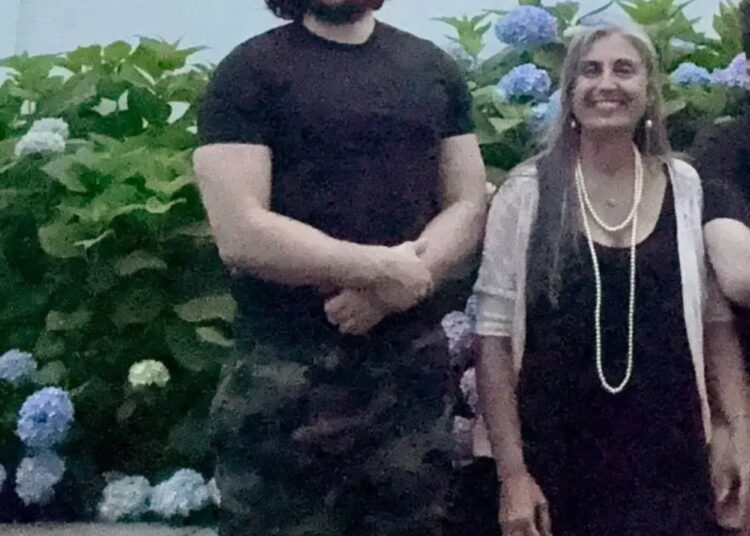Abdullah Bozkurt/Stockholm
A detailed 48-page FBI criminal complaint filed in the US District Court for the District of New Jersey lays bare how Turkey was at the heart of a transnational ISIS recruitment and logistics network that spanned the United States, Sweden, the United Kingdom, Finland and the Middle East.
The document, sworn by FBI Special Agent Dylan James Cochran, accuses Tomas-Kaan Jimenez-Guzel, 19, a national of the United States, Turkey and Spain, and Saed Ali Mirreh, 19, from Washington State, of conspiring to provide material support to the Islamic State in Iraq and Syria (ISIS) by plotting to travel through Turkey to reach Syria.
Both were arrested on November 4, 2025 — Jimenez-Guzel at Newark Liberty International Airport en route to Istanbul and Mirreh later that day at his home in Washington.
According to the FBI the pair and their online co-conspirators — spread across Europe and North America — chose Turkey as their “staging area” to reach ISIS-held territory. In encrypted chats from July to November 2025 Jimenez-Guzel described an elaborate plan to regroup in Diyarbakır, southeastern Turkey, before being smuggled into “Sham,” a code word for Syria.
The Diyarbakır region, the complaint says, was portrayed by Jimenez-Guzel as “the hub” for jihad operations. He told the group that “all of the weapons, vehicles, technology and drones are in Diyarbakır … you can buy anything you want, it’s like a free black market.” He further claimed to have personal contacts with Turkish weapons smugglers, boasting, “I know a weapons smuggler. I’m gonna simply ask him to smuggle us.”
In multiple messages Jimenez-Guzel emphasized Turkey’s geographical and logistical importance, declaring that Turkey was “the easiest” route because “people go from Turkey to Iraq all the time — and Sham. Turkey borders both Iraq and Sham.” He insisted that each group of foreign recruits traveling to Turkey should include at least one Turkish-speaking member capable of “passing as a local.”
Text of the indictment that was filed against Tomas-Kaan Jimenez-Guzel, a national of the United States, Turkey and Spain, and Saed Ali Mirreh, a US citizen:
Jimenez-Guzel also speaks Turkish, as his mother, Meral Guzel, is originally from Turkey. She was educated in Turkey and earned a degree in economics from Marmara University in Istanbul before moving to Europe, then to Ecuador and later to the United States. She married Jimenez-Guzel’s father, a dual Ecuadorian and Spanish national, but the two later separated. Meral Guzel moved back to Turkey in 2014 and subsequently returned to the United States, where she now leads the UN Women’s Entrepreneurship Accelerator, a program under the UN’s umbrella that focuses on advancing women’s rights and economic empowerment.
The conspirators even mapped out four potential border crossings from Turkey into Syria and circulated photos and maps marking the routes.
The FBI affidavit shows that the two young men coordinated their flights to Istanbul, joining other members of the cell who planned to travel from Sweden, the UK and Finland. On October 27, 2025, Jimenez-Guzel bought a one-way ticket from Newark to Istanbul for November 17. The next day, Mirreh booked his own flight from Seattle-Tacoma to Istanbul on November 16.
After a connected cell in Dearborn, Michigan, was busted by the FBI for a separate ISIS plot, the pair accelerated their plans, rebooking their Istanbul departures for November 5. Jimenez-Guzel was arrested at Newark hours before boarding his Turkish Airlines flight, while Mirreh was detained later that night at his Washington residence.
Throughout the summer the suspects and their co-conspirators discussed smuggling routes and weapons procurement networks in Turkey. The conspirators planned first to gradually bring recruits from Western countries to Egypt. From Egypt they intended to move those recruits into Turkey. Once in Turkey the group planned to settle in Diyarbakır to establish a presence and prepare. Finally, after settling, they intended to cross into “Sham” to “take action,” which could include media work, armed jihad, martyrdom operations or in-person dawah (face-to-face religious outreach).

The conspirators envisioned Diyarbakır as both a training ground and a logistical base where “Western brothers” could meet, acquire weapons and coordinate crossings. They explicitly discussed the use of Turkish smugglers for both weapons and personnel movement.
Jimenez-Guzel warned the group that it was too risky to cross legally into Syria and advised “going through smugglers at night,” using buses across Turkey to avoid police scrutiny. “We’re mostly gonna be going very early in the morning or very late at night,” he said during a recorded video call. They also discussed housing options in Turkish cities, with Jimenez-Guzel circulating videos of apartments and rental listings, suggesting they live in small rural villages “because I know some guys there.”
The FBI affidavit notes that three members of the cell including Jimenez-Guzel spoke Turkish and intended to use that to their advantage. One message stated, “Three of us speak Turkish and can pass as locals.” The group viewed this as essential for avoiding Turkish counterterrorism surveillance, saying that “Turkey used to [search for jihadists],” implying that the perceived risk had decreased.
Jimenez-Guzel’s messages reveal a detailed understanding of Turkish geography and transit infrastructure. He instructed others to avoid flying directly into Istanbul and to instead purchase multi-leg flights that could conceal their true destination. “Don’t buy tickets that have Istanbul as the final stop,” he wrote. “Buy something that looks like transit or tourism.”
One of the most revealing sections of the FBI complaint documents how Diyarbakır was described as a “free black market” where everything from firearms to drones could be bought. “All of the weapons, vehicles, technology, drones are in Diyarbakır … U can buy anything u want,” Jimenez-Guzel told the group.

This aligns with previous Western intelligence assessments that Turkey’s southeastern borderlands remain saturated with smuggling networks connecting to Syria’s Idlib and Raqqa regions.
The complaint also mentions plans to later shift the crossing point toward Erbil in Iraqi Kurdistan due to Turkish border militarization, showing the cell’s adaptability and regional contacts. Their operational plan was to fly to Istanbul and then travel onward to Erbil in Iraqi Kurdistan, which they considered culturally similar to Diyarbakır.
Co-Conspirator 5 would already be in Erbil to meet them so they would not have to worry about housing, food or other necessities. They agreed that otherwise “everything else is the same” with respect to their plan, and they debated whether to purchase one-way or return tickets, acknowledging that return tickets are safer but more expensive. They also stressed practical cover and said members should look and behave like locals to avoid detection.
The FBI document reveals that Jimenez-Guzel had already traveled to Turkey earlier in July 2025, flying from Newark to Istanbul on July 4. While there, he messaged a contact saying he had chosen “the path of jihad fi sabilillah” (in the path of God) and urged others to follow him. He returned to the US on August 24 and resumed university studies in New Jersey while continuing to plan a larger coordinated departure through Turkey. His earlier trip likely served as a reconnaissance mission to test flight paths, accommodation and border procedures.

The chats detailed plans for multiple sub-groups, based in the US, Sweden and the UK, to converge in Istanbul before taking long-haul buses to Diyarbakır, about 1,000 kilometers southeast. “In max six months, we’re gonna link in Diyarbakır,” he told his co-conspirators. “We’re gonna go in groups. Every group needs one Turkish-speaking person.”
They planned to film recruitment videos in Turkey to publicize “Western Muslims making hijrah to Dar al-Jihad,” echoing ISIS propaganda tactics from 2014–2016. “Media is very important. We have to show the world that Western Muslims are going to dar al-jihad. It will motivate others,” Jimenez-Guzel said.
The FBI found that the plot was organized across several countries. A Sweden-based member identified as Co-Conspirator 3, or Bob, was elected by the group to be the overall leader. Mirreh was the alleged “finance guy,” accused of raising thousands of dollars to fund travel to Syria with the help of online scammer Bob. Co-Conspirator 4, based in the United Kingdom, handled logistics. Co-Conspirator 5 in Finland managed parts of the encrypted chat infrastructure.
Co-Conspirator 6, also in the UK, claimed weapons-training experience and offered to help with tactics. The US recruits, including Tomas-Kaan Jimenez-Guzel and Saed Ali Mirreh, were assigned to join and meet with the European groups in Turkey. This structure mirrored classic ISIS foreign-fighter pipelines from Western Europe to Syria, with Turkey as the funnel point.
Despite Turkish government claims that the southern borders are sealed, the FBI complaint confirms that US-based extremists still view Turkey as the most accessible corridor to ISIS territory.

Intelligence experts have long pointed to the Turkish provinces of Diyarbakır, Gaziantep, Kilis and Şanlıurfa as historical transit nodes for ISIS fighters between 2013 and 2017. Networks of local smugglers, corrupt officials and militant sympathizers facilitated crossings into Syria’s Raqqa and Aleppo regions — routes still considered viable by jihadist recruiters.
In this case the conspirators’ discussions reflected current smuggling practices: moving through Turkey with forged cover stories, traveling by bus to border provinces and using local Turkish contacts to cross at night through mountainous terrain or unofficial checkpoints.
The FBI’s swift action stopped the two young men before they could reach Istanbul. The complaint makes clear that they were already coordinating with overseas ISIS facilitators and had pledged allegiance to the group. Photos recovered from their phones showed Jimenez-Guzel posing in front of an ISIS flag with a knife, while Mirreh sent images wearing an ISIS hat and holding a gun.
Jimenez-Guzel even posted a statement online about conducting a Boston-bombing-like attack. “Ameeica [sic] is next. In 2 weeks, we will be all over the news in Boston,” he said in his comments on a video sharing platform. In October 2024 the FBI interviewed him at his residence during which time he acknowledged, among other things, that he was the user who had made the aforementioned statement.
Both Jimenez-Guzel and Mirreh have been charged with conspiracy and an attempt to provide material support to a designated foreign terrorist organization, with each charge carrying up to 20 years in prison.
The case underscores how, two decades after ISIS’s rise, Turkey remains a key transit artery for extremist networks, offering the infrastructure, geography and gray zones that make jihadist mobility possible. Since the start of the Syrian crisis in 2011, President Recep Tayyip Erdoğan’s Islamist government has facilitated, armed and provided logistical support to various jihadist groups in Syria, including clandestine assistance to ISIS factions. Turkish judicial and law enforcement authorities have often adopted a lenient approach toward ISIS members, with most detentions leading to quick releases and trials frequently ending in acquittals.
For counterterrorism officials, the Jimenez-Guzel–Mirreh plot is a chilling reminder that while ISIS’s “caliphate” is gone, its global recruitment pipelines through Turkey have not been dismantled. The Diyarbakır plan, as captured in the FBI’s own evidence, shows that the same corridors once used by tens of thousands of fighters are still being scouted, this time by digital-age radicals from America and Europe.












